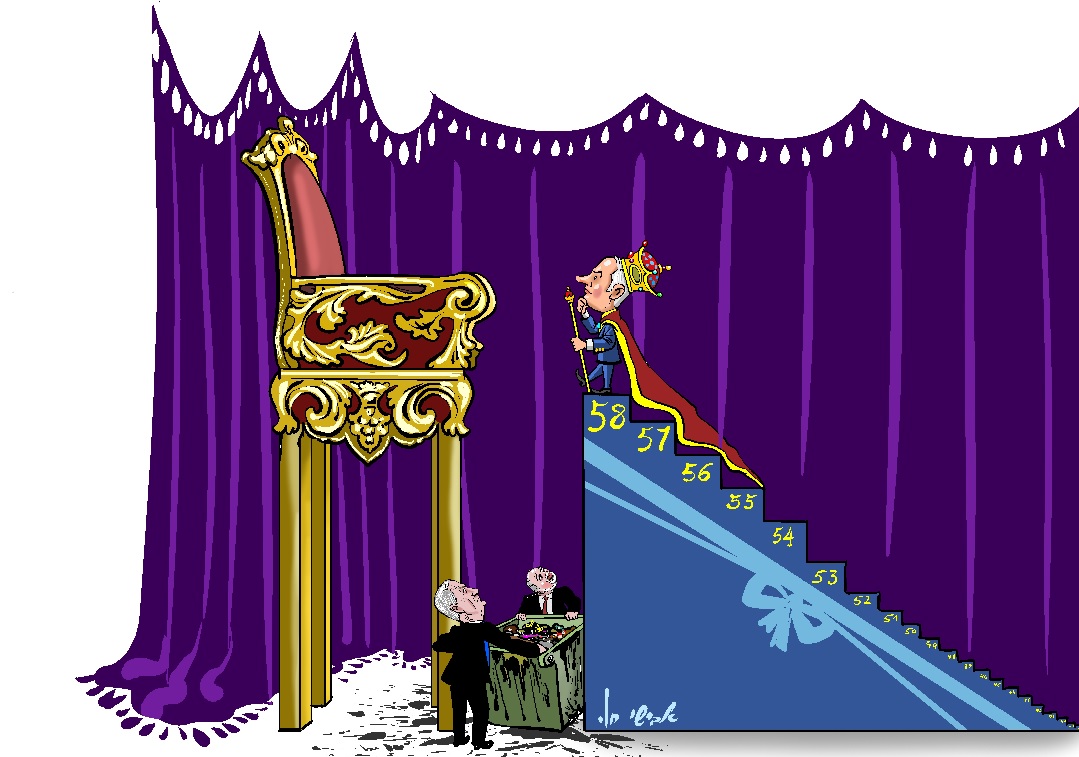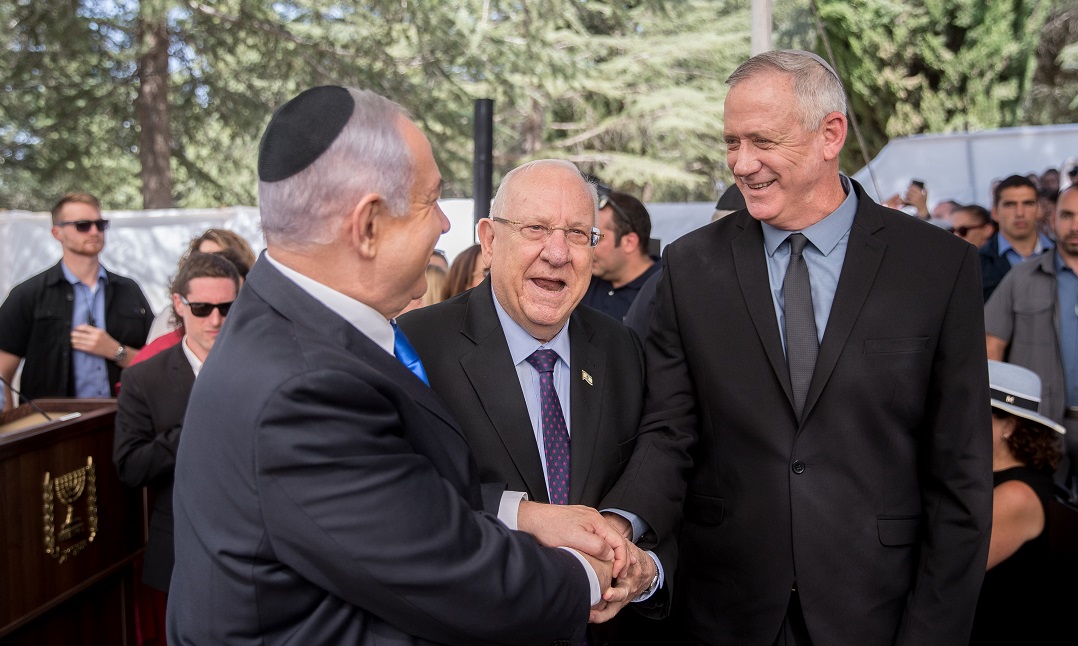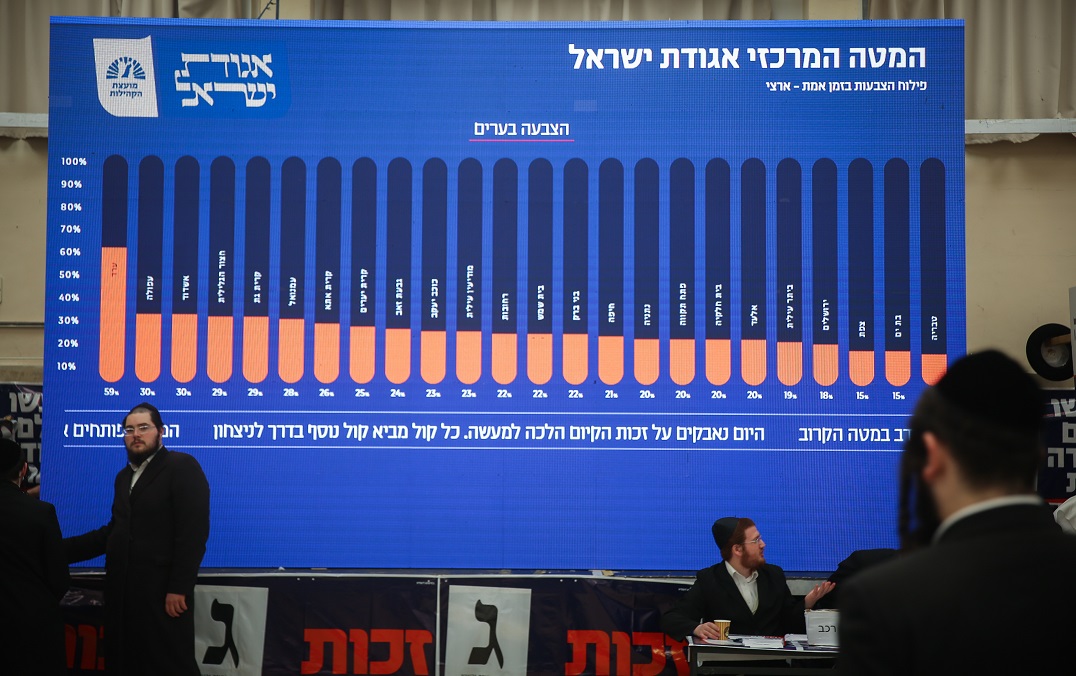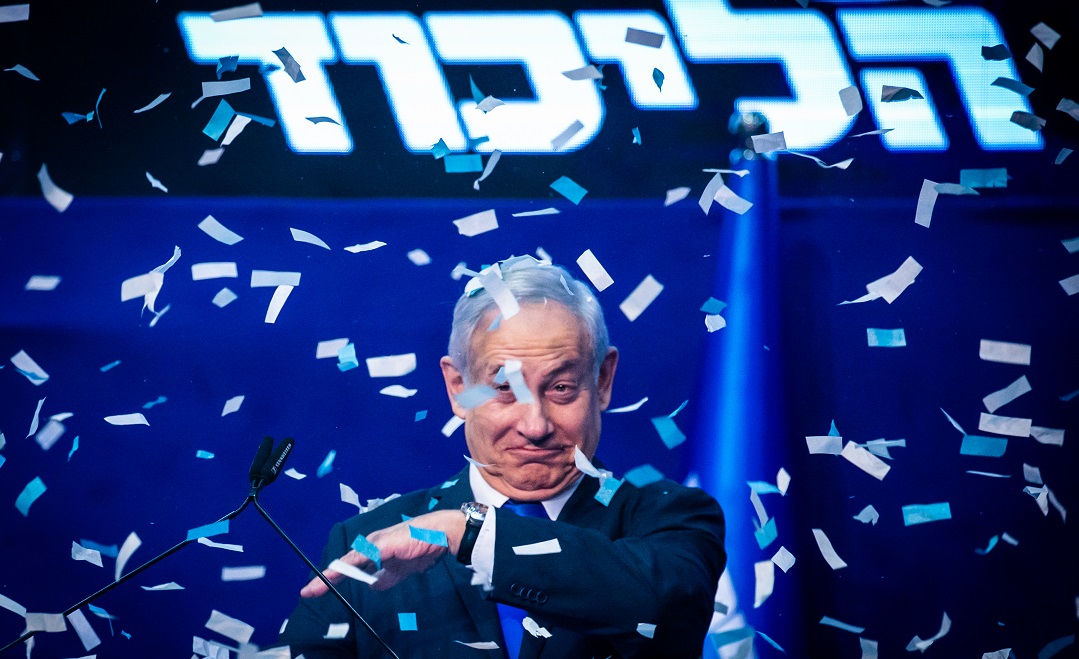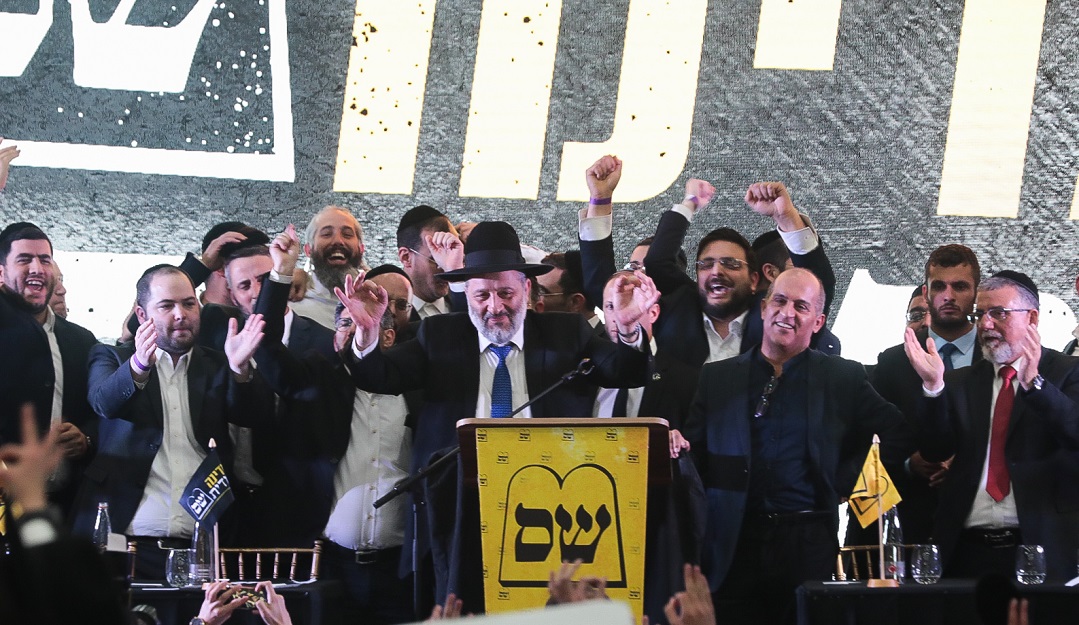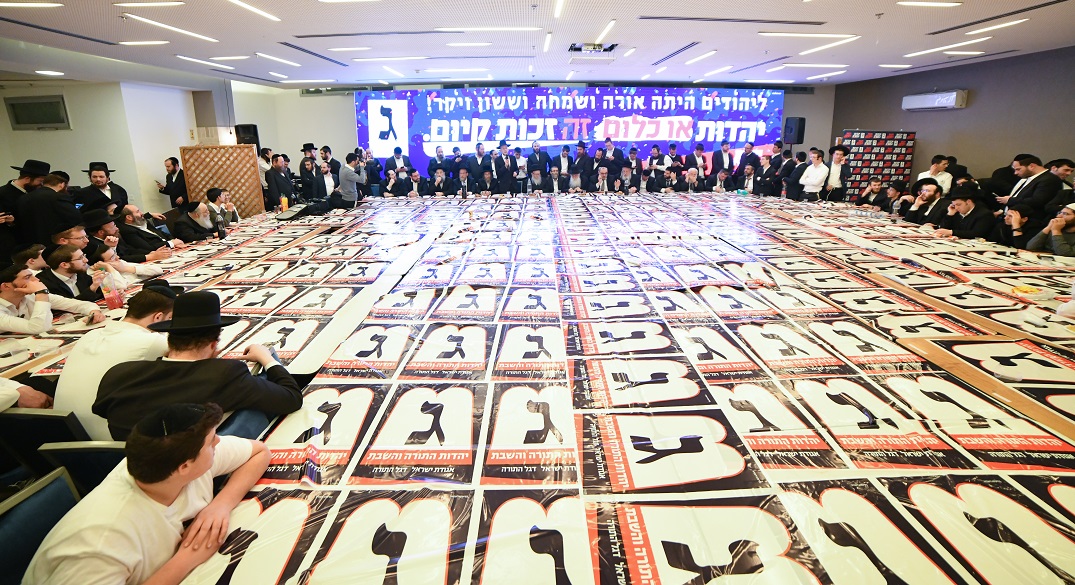We Have Done Ours

UTJ reflects on the elections: the record-breaking increase, the hysteria and panic on Election Day afternoon, turnout numbers and the Rebbe’s dance with the MK
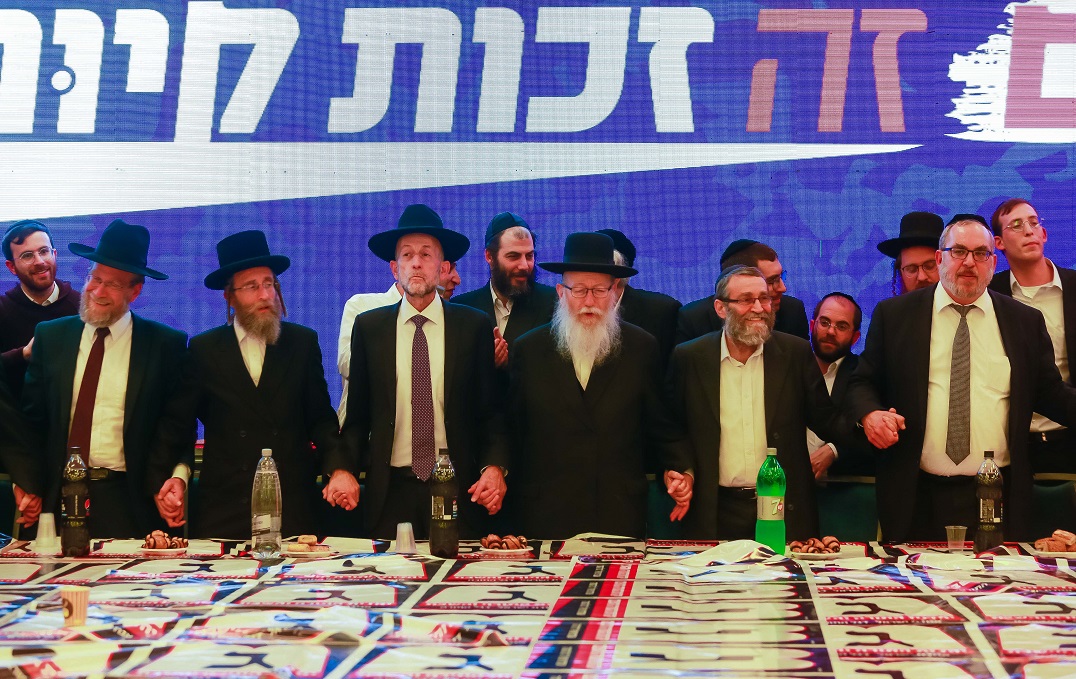
F
or chareidi voters, the most moving moment of Israel’s Election Day was not the victory party at the Zechor Avraham shul in Givat Shmuel — although the dancing crowd, joined by United Torah Judaism MKs and top-tier askanim, was certainly lively.
Nor was it that moment when United Torah Judaism MK Yaakov Asher took his elderly father to the polling station; or during the afternoon, when low turnout was reported in chareidi areas and the Belzer Rebbe went out to vote for the second time in his life, at a location near his house, accompanied by his representative, UTJ MK Rabbi Yisrael Eichler.
The loftiest and most surprising moment occurred with the newest MK, Yaakov Tessler. He went with his Rebbe to vote at the Vizhnitz Bais Yaakov in Bnei Brak. At the end of the vote, the Vizhnitzer Rebbe grasped Tessler’s hands and broke into a dance with him, singing, “Hashem Hu Malkeinu, v’lo anachnu avadim...” He repeated these words twice and then a third time.
“When we vote Gimmel, we effect a kiddush Sheim Shamayim,” the Rebbe said to those present. “And that is our goal, to sanctify Hashem’s Name.”
“Gedolim throughout the generations viewed going to vote as hishtadlus, and each person has to make his effort,” an Agudas Yisrael source tells Mishpacha. “But there is no doubt that the general hishtadlus does not rely on the vote of each individual, which is a kiddush Hashem in its own right. As the Vizhnitzer Rebbe said, that is our purpose in this world and that is the reason we conducted a very nuanced campaign, focusing on communities — and it has become evident over the past year and a half how the Iggud Hakehillos has proven itself on a day-to-day basis.”
UTJ did not only invest in its internal communities. When MK Moshe Gafni visited towns beyond the Green Line, it was something new. No one thought UTJ would make significant gains in Yehuda and Shomron. Let’s put the exact numbers aside for a moment, and the fact that Otzmah Yehudit and Yamina were not an option for many chareidi-leumi (“chardal,” in Israeli parlance) residents, and many in the national-religious sector chose to give their votes to the party that declared itself as “right wing l’mehadrin.”
Deputy Education Minister Meir Porush of UTJ, popular in bastions adhering to the worldview of “Eretz Yisrael Hashleimah,” spoke for many when he said he hoped Otzmah Yehudit leader Itamar Ben Gvir would not be responsible for thwarting the chances for a 61-seat right-wing government: “The public will not forgive him.” (The way things stand now, it appears that is exactly what will happen, despite the relatively paltry number of votes that Otzmah Yehudit received.)
Yitzchak Pindrus, an MK for UTJ in the last Knesset, noted that “a large part of the rise in UTJ’s strength resulted from the obvious surge of votes from the national-religious sector in a focused campaign.” As an example, throughout the day on Tuesday, UTJ cited significant gains in numbers from towns in Judea and Samaria. In Talmon, there was an increase from 92 votes to 146; in Efrat the party went from 63 supporters to 95; and in Naveh, the hometown of Yamina’s Rafi Peretz, UTJ came in first place for the second time this year, growing from 125 to 140 votes.
In addition, the central headquarters of the litvish Degel HaTorah faction reported that amid increased general turnout, UTJ had managed to bring in new voters. “There was extensive work in the kiruv field. Many thousands of people sent requests for a brachah, and many of them came personally to receive the brachos from the Rosh Yeshivah, Rav Gershon Edelstein, and Rav Chaim Kanievsky. Dozens of avreichim were assigned to this project.”
We Have Done Ours
Until the final moments and the victory speeches on Election Night, the campaign offices endured a rather difficult day. Apathy was eroding turnout — at least according to figures that were appearing on their screens. (The accuracy of those figures is not always certain, because the Central Elections Committee does not release a breakdown of votes in specific areas or towns; that information is compiled by the parties and campaign staff.)
So the campaign focused inward. Phone operators urged those who had not yet voted to run to polling stations. Loudspeakers mounted on vehicles were dispatched to chareidi areas with a clear declaration: “There are high turnout numbers in the secular areas and low numbers in the chareidi areas. Gedolei Yisrael have instructed everyone to go out to vote.”
Rabbi Porush began Election Day with Shacharis at Kever Rashbi in Meron, where he was also assailed by extremist elements screaming, “Rasha, apikorus!” He then traversed the country, from the Galilee to Jerusalem, before concluding the day in Givat Shmuel, a small city nestled between Bnei Brak and Petach Tikva, at a hall that had been booked for the post-election celebration. At one of his stops, in the mixed city of Nof HaGalil, he called for people to shake off their lethargyand to bring new voters after they voting themselves. Health Minister Yaakov Litzman, who also later visited Har Yonah in Nof HaGalil, cautioned voters that “Lieberman is building on your apathy.”
In the afternoon, all the representatives of the chassidic communities that comprise the Agudas Yisrael faction were called to action. They recorded messages that included calls to vote and exhortations to meet the goals the chassidic courts had each set for themselves. Minister Litzman also sent a message to community representatives: “This is an emergency! The high general turnout numbers, compared to the chareidi numbers, will lead us to a potential defeat, Rachmana litzlan. Kavod Shamayim and the kavod of gedolei Yisrael are at stake. Everyone has a personal responsibility to urge someone who he knows to also go vote.”
At the central Degel HaTorah office in Bnei Brak, Chairman Gafni also sounded a desperate call: “For some reason, things are very sleepy. This apathy in our community will cost us dearly. I am asking you, go vote! This is vital for us. It’s not a slogan — it’s Yahadut or klum [nothing], chalilah!”
At one point, MK Yaakov Asher used guided imagery. He came to the Degel HaTorah campaign office in Modiin Illit and told the activists there: “Imagine Lieberman’s face when he is informed he went down to five mandates and UTJ goes up to nine… If you imagine that, we can also get to 11.”
At this worrying stage, with the central offices reporting low voter numbers and panic in the voices of MKs giving interviews, MK Maklev got a call from Rav Baruch Dov Povarsky, rosh yeshivah of Ponevezh. “We are doing all we can for kavod Shamayim. And HaKadosh Baruch Hu will do the rest for us.”
Beyond the initial low turnout, there were just a handful of irregularities in the voting process. In Modiin Illit there were complaints from people who came to vote and were told they had voted already. In the afternoon, UTJ said it planned to file a complaint to the Central Election Commission and the police against efforts to mislead people by phone. According to reports, residents of the central region received messages that they “had already voted, so there was no need to go to the voting places.”
A Good End
At the end of the day, despite the valiant efforts of dedicated activists, it looks like UTJ is falling short of its longed-for eighth mandate. And although the first exit polls showed the right wing estimated at 60 mandates, the latest vote count show that figure falling to 58 seats. Rabbi Litzman quickly spoke to all the leaders of the right-wing bloc, notably Prime Minister Netanyahu, who he wished, “B’shaah tovah, baruch Hashem, and mazel tov.” Netanyahu then called Degel HaTorah chairman MK Moshe Gafni, who congratulated him on his victory. The prime minister invited the chareidi representatives to a meeting the next day of the right wing bloc.
The speeches at the victory rallies of UTJ centered around the relative increase in voters and the overall success of the right-wing bloc in surpassing the votes of the left-wing bloc.
MK Eichler took a dig at Yisrael Beiteinu leader Avigdor Lieberman: “Rabbanim and gedolei Yisrael came from Russia,” he said. “We will not give Lieberman the Jews of Russia. There’s a good reason why he looks tonight like [ousted anti-chareidi Teveria mayor] Ron Kobi.
“Hallelu es Hashem kol goyim — because the non-Jews know what they wanted to do to us and what we were saved from. Throughout the years, they tried to couch their real plans in nice words like freedom and equality. Today they say it all bluntly, to the point that they have been rejected outright by the public. Imagine had they won, what a chillul Hashem it would have been.”
MK Tessler thanked the activists and the voters. “You have given the most resounding response to all the inciters and destroyers of religion. That is our real victory. At the same time, we are all hoping to hear that the greatest fighter against Yiddishkeit, Lieberman, has sustained a blow and that his power has declined significantly, because the Israeli public is sick of his hatred and incitement against the chareidi sector.”
Maklev said it in his own words: “We can come today to gedolei Yisrael and say: ‘We carried out our mission faithfully.’ Tonight we are committed to continuing this connection even with the new communities that joined us. Many people have said with their vote, ‘Enough hate and incitement!’ ”
And after everything is said and done, if there’s something we want to forget about this election, it will be the incitement and hate.
(Mishpacha.com)
Oops! We could not locate your form.







